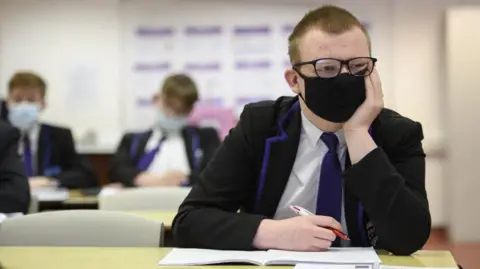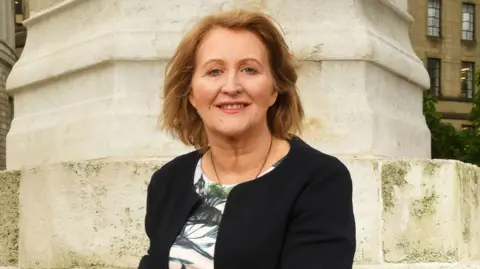 Getty images
Getty images- The former children’s commissioner for England said the decision to open pub gardens while schools remained closed during the pandemic was a “terrible mistake”
- Giving evidence to the Covid inquiry, Anne Longfield said schools should be “the last to close and the first to reopen” in future emergencies
- The then-Education Secretary Gavin Williamson had said during the pandemic that he wanted nothing more than to “get schools back to normal”
It was a “terrible mistake” to open pubs while keeping schools shut during the pandemic, an inquiry has heard.
Anne Longfield, who was the children’s commissioner for England during Covid, was giving evidence to the second round of public hearings.
Politicians should ensure children’s needs are never overlooked again in future emergencies, she said.
She added schools should be “the last [services] to close and the first to reopen” – unlike what happened during Covid.
The most vulnerable children will be struggling with the impact of the pandemic for the next 10 or 20 years, she said.
In March 2020, the UK’s 24,000 schools were closed for most children and examinations cancelled.
In the months that followed, schools were reopened and closed multiple times for most children.
The then-Education Secretary Gavin Williamson said at the time he wanted nothing more than to “get schools back to normal”.
Ms Longfield told the inquiry the government made decisions which on occasion “lacked coherence” and was “indifferent” to the impact of policy decisions in children.
While the initial school closures were necessary, she says the decision to keep schools closed for most children from March 2020 to September 2020, while at the same time increasing social interaction in other parts of society, was a “terrible mistake”.
“We had ‘Eat Out to Help Out‘ instead of schools opening,” she said.
In June 2020, as part of a phased return in schools, Mr Williamson said robust protective measures had been put in place, and that it was “in every child’s best interest to return to school if they are eligible and able”.
“A measured return is part of our roadmap, it’s part of how we will recover and rebuild,” he said, adding the plan was to bring all children back to school in September 2020.
So while pubs, restaurants and non-essential shops were reopened in June 2020, schools were still shut to the vast majority of pupils.
Ms Longfield said children had been “at the back of the queue” and “always overlooked”.
Schools and ensuring access to education needed “a national creative effort on the scale of the Nightingale hospitals“, she added.
She said other countries were using neighbouring public buildings and hiring retired teachers in order to keep schools open.
 PA Wire
PA WireDuring the pandemic, Ms Longfield met on a fortnightly basis with senior officials. She said she “was often one of a small number of voices making the case for children to be a priority”.
In her written evidence, she highlighted three areas where she believed the government failed to act in children’s best interests:
- Its policy towards school opening and access to education
- Decisions about children’s ability to socialise and use public spaces
- Decisions to reduce the safeguarding protection to vulnerable children in social care
She said lockdowns removed most of the usual ways of identifying children at risk.
These included going to school, GP surgeries and children’s centres as well as contact with professionals such as health visitors, teachers and social workers, who were often only working through screens.
“Tragically, for some children who lost their life during the pandemic, not due to Covid, but due to violence, these decisions may have increased their vulnerability to harm,” she wrote.
She quoted government figures which show there were 223 child deaths involving abuse or neglect in 2020-21, up from 188 the previous year – a figure that also includes looked-after children.
Unable to play in groups
The inquiry heard that in some countries, children were at the forefront of national concerns. The prime ministers in Norway and New Zealand held TV briefings for children at the start of the pandemic to reassure them and to thank them for all they were doing.
“We didn’t have such an event in the UK, despite my requests to No 10 and the prime minister,” Ms Longfield said.
While policies on school closures and exam cancellations were broadly similar across the four UK nations, the former children’s commissioner said there were other notable differences.
In England, children were not exempt from the “rule of six” arrangements, which prohibited social gatherings of more than six people – unlike their peers in Scotland and Wales.
This meant at times children in England were unable to play with friends or spend time with grandparents while those in Scotland and Wales could.
She said children should be put at the heart of planning for future emergencies, with schools “the last to close and the first to reopen”.
Ms Longfield is calling for a more ambitious recovery plan and the appointment of a minister for children to tackle the long-term impact of lockdown and school closures.
Research shows the number of children seeking NHS help for mental health problems has risen since the pandemic, persistent absence in schools is struggling to get back to pre-pandemic levels and the attainment gap is widening.
